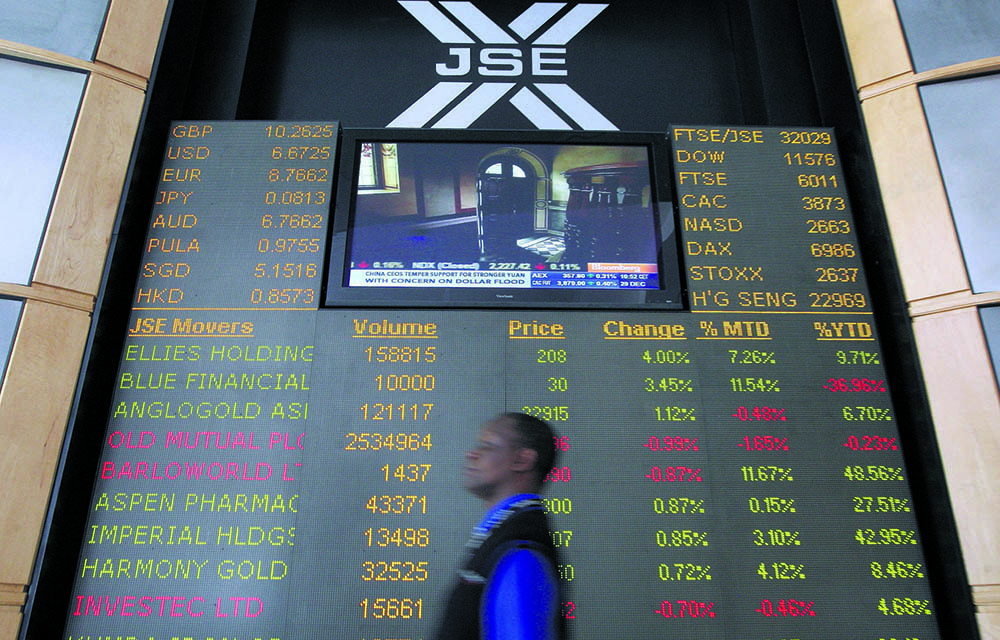

According to Sam Mokorosi, head of origination and deals at the JSE, the local bourse has made a concerted effort to make listings easier and attractive “without compromising on investor protection”. Last October, following a public consultation process, the JSE proposed amendments to its listings framework aimed at boosting competitiveness.
“Most delisting trends are cyclical, given the JSE’s focus to address the current challenges and concerns raised by the market, we do believe that we are doing everything in our control to ensure a robust capital market,” Mokorosi said in response to questions from the Mail & Guardian.
Despite the delistings, the JSE’s total market capitalisation continues to rise, Mokorosi noted. There are 297 companies listed on the JSE and an overall market cap of R 21.8 trillion.
Meanwhile, a newcomer in secondary exchange A2X has stepped on the JSE’s turf, attracting brokerages with its far lower costs. The JSE makes a lot of its money through transactions and, if its volumes start to drastically decline as result of competition from A2X, the incumbent could be in trouble.
Speaking to the M&G last week, A2X chief executive Kevin Brady said that the immediate focus of the secondary exchange is to grow its market share, increasing its listings and adding more brokerages. Between April 2019 and April 2023, the combined market capitalisation of A2X listed securities has grown from around R2.5 trillion to almost R9 trillion.
A2X has also set its sights on becoming a primary exchange.
“However, we are very conscious that South Africa’s regulatory environment is outdated. And, at this point in time, it does not really support a competition exchange like ourselves,” Brady said, noting that the regulations don’t allow for the transfer of listings from one exchange to another.
In this case, A2X may be able to catch some minnows but will struggle to persuade bigger companies to delist from the JSE and list with the newer exchange. Notwithstanding the regulatory barriers to A2X becoming a primary exchange, the competition has been enough to make JSE shareholders antsy.
Deregulate
The Lowenthal family have been JSE shareholders since the bourse was demutualised and listed. In separate conversations with the M&G, the Lowenthal brothers — Martin and Howard — said the JSE is allowing A2X to eat its lunch.
The pair have been vocal critics of the JSE’s onerous listing requirements. “We have deep emotional ties to the JSE … The problem is that the JSE seems to have rejected the idea that it should be a platform for new companies. They are even allowing some of their trading to go to the other exchanges,” Martin said.
“To me, every trade that they lose is a disaster.”
For the Lowenthal brothers, the JSE has to be the marketplace for companies to raise money and for investors to take stock. But, according to Howard, the JSE has instead become something of a watchdog, only listing what it believes are quality companies.
“Don’t tell me about quality companies. We couldn’t list a thousand venture capital companies and lose as much money as Steinhoff, EOH, Tongaat Hulett … You can’t regulate poor accounting. That is the job for the auditors and the regulators,” Howard said.
“Just look where we are. We’re on the southern tip of Africa. What do we need all these rules and regulations for?”
South Africa’s public market is broken and is serving a very narrow function, Martin said. The public has largely been left out, because investors cannot commit capital to growing companies. This is as institutions have favoured the top end of the market.
“It’s crisis time. They have totally lost their way. Their volumes are dropping. The number of listings is dropping. So, clearly, the current business model is not working and they have to make some changes,” he said.
“We have seen virtually nothing in the last five or six years. A little bit here, a little bit there. There should be a top to bottom overhaul of the JSE, from every aspect — from a listing aspect, from a trading aspect, from a personnel aspect. It needs a total overhaul.”
The M&G reached out to some of the JSE’s largest shareholders, namely Allan Gray, Ninety One and PSG.
Both Allan Gray and Ninety One suggested they have engaged with the JSE on the issues hindering listings. Sumesh Chetty, portfolio manager at Ninety One, said the JSE is well aware of the issues and working on them as a matter of urgency.
At the time of writing, PSG had not responded to the M&G’s request for comment.